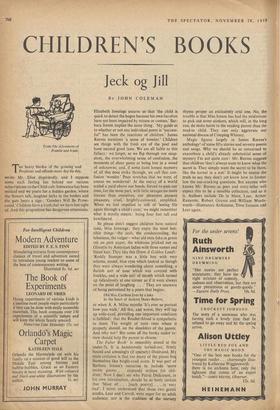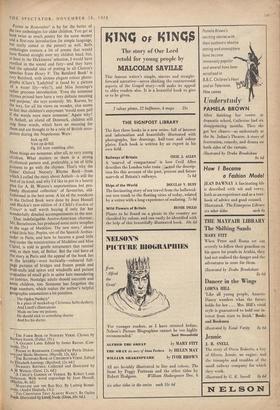Captain Frank Knight
very Mines of Solomon. SIMON RAVEN Billy Bunter, on the other hand, is not a credit to his world. In Frank Richards's original weekly stories in The Magnet, Bunter was no more than a foil to those clean and hard-playing schoolboys, Harry Wharton, Bob Cherry and the rest. Bunter merely snored in front of the fire while the big match was on and ate all the crumpets while the teams were still changing. But Bunter, like Falstaff, was too genuine a creation to stay long in a minor role; he has become a national figure, and in Cassell's present series (of which Billy Bunter the Hiker is No. 23) Bunter is paramount in importance throughout. Thus Mr. Richards, Yielding to popular demand and recognising a fundamental human truth, performs a valuable service for us all. For there is, in all of us, a baCk- sliding tendency towards the traditional faults of the fat man; we all have our moments of greed, y'
ALL of us who were bringing up children in the years after the war have a special feeling about Spock. His little book was part of the essential furniture of our lives. In it the puzzled, worried parent' could find answers to every question : sensible, practical and reassuring answers, given by a humane and understanding man who knew what he was talking about. Here, we felt, is someone who has met and dealt with all the endless run of little crises in the life of the grow- ing child and learned the best ways of handling them. Indeed, Dr. Spock became in a very real sense a member of the family, and his advice and support and good judgment in the day-to-day care of the child were valued and trusted.
The new edition of Baby and Child Care is of larger size and has more pages; some of the chapters (for example, on twins) are longer, but the orientation of the book and the tone of voice are the same as ever. In the foreword, Dr. Spock comments, very properly, that his book is not a substitute for medical supervision by the family doctor; if there is any question of illness, the doctor must be called at once. The author's aim is to provide a general survey of the behaviour and oddities of the human animal in early life, its troubles and needs, and thus offer some assistance to the inexperienced; in the second edition he does just that, with even more grace and quiet assurance than before.
The English reader will notice that the sections on discipline have undergone some changes.. In 1946, the American ways of child management were, Dr. Spock thought, rather too strict, 'but the trend was towards great flexibility and this trend he did all he could to encourage. Now the pendulum has swung over the other way and the conscientious parent is more likely to get into trouble by being too permissive. The normal child is happier and better behaved if his parents insist on reasonably good behaviour; at the same time, it helps the child to realise that- his parents know he has angry feelings, and yet are not en- raged or alienated from him because of them. Too much 'freedom' makes the child demanding and disagreeable; his mother tries to be super- human and forgiving for a while, then she ex- plodes, and thereafter is guilty and confused. She should let the child see that she knows how to be firm and still friendly.
On the first page of •his book Dr. Spock gives one of the principles that inform his teaching : that the natural loving care which kindly parents give their children is a hundred times more valuable than pinning up the nappies in the approved fashion. On the second page he reminds us that parents have needs as well; that some children are a lot more difficult than others; and that needless self-sacrifice makes people sour. Good luck and many thanks to you, Dr. Spock; may your book go on to a hundred editions.
MILES HOWARD
KIM Rudyard Kipling
'A splendid new edition ... for the child with a real love of books it is a splendid buy.'—Books and Booktnen.
Illustrated by Stuart Tresilian. 2Is
THORVALD'S PLAN
Alison Cross
Life on a farm in the wilds of Norway a hundred years ago. Illustrated.
Dec. 4. lOs 6d
THE TREASURE OF UR
Marianne MacDonald
A lively mystery seasoned with humour, involving four children and a yacht on
the Broads. Illustrated. 13s 6d
Harrap Books
FOR YOUNG PEOPLE
Clowns
DOUGLAS NEWTON The story of clowns and clowning from the earliest days. "A 'must' for every- one who loves the Circus."- Manchester Evg. News. Illustrated I2S. 6d.
Ballet Music
ROGER FISKE, author of Listening to Music. One of the few books published on music composed specially for the ballet. It shows how to increase one's pleasure by giving more attention to the music. Illustrated 12/6
The Young Rider Through the Ages
DOROTHY M. STUART. "Delightfully nostalgic."-Good Housekeeping. "Most en- tertaining."-Pony. "Excellent . .. a mammoth task-and how well she has done it."-Eliza- bethan. Illustrated I25. 6d.
Prehistoric Animals
SAM & BERYL EPSTEIN. "Most inform- ative."-Scotsman. "Engrossing."-Notts Evg. Post. "This revelation of scientific 'detective work' is most absorbing."-Bristol Evg. World. Illustrated. us. 6d.
Meals Through the Ages
PETER MOSS. "Describes in intimate detail what sort of dishes were eaten in homes of every class (in England) over a period of 1,5oo years."
-Bristol Evg. Post. Illustrated 'se.
The Book of American Frontier History
PHILIP WILDING. "Told in a racy style which will absorb all older children interested in the Wild West."-British Weekly. Illus- trated, including colour. r5s.
French Railways of Today
VIVIAN ROWE. "Simple enough to intrigue the young reader, sufficiently advanced to satisfy the most adult desire to 'play trains' . . it's a winner."-Catholic Herald.
Illustrated. los. 6d.
Grenfell of Labrador
GEORGE H. PUMPHREY. "His life, with its blending of adventure and idealism, is lust what should appeal to young readers."- British Book News. Illustrated 9s. 6d.
HARRAP, High Holborn, London, W.C.x































































 Previous page
Previous page